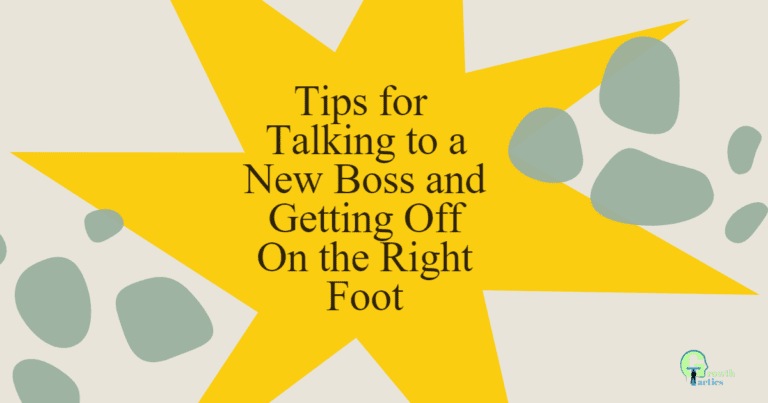Introducing yourself to a new boss can be a nerve-wracking experience. The first impression you make can have a lasting impact on your working relationship.
That’s why it’s crucial to approach your interactions with tact and confidence. In this article, we will discuss valuable tips on how to talk to a new boss and ensure a positive start. From effective communication strategies to building rapport, we will explore various ways to establish a strong foundation with your new boss and make a good impression.
So, let’s dive in and discover how you can navigate this crucial aspect of the boss-employee dynamic.
Jump To Section
Meeting Your New Boss
As you prepare to meet with your new boss, it’s normal to have a few jitters. You may be wondering what to expect and how to present yourself. Here are a few essential tips to help you make a positive impression:
First Meeting with a New Boss
In your first encounter with your new boss, you want to show that you are approachable, confident, and eager to work with them. Start by introducing yourself and offering a warm welcome. Depending on your work culture, you may want to shake hands, fist bump, or simply acknowledge your new boss with a wave.
Be attentive and listen carefully to their introduction. You can take mental notes about their background, management style, and communication preferences. It’s essential to listen more than you speak during this initial encounter.
Consider asking some questions to learn more about your new boss and their vision for the team. Some possible questions to ask include:
- Can you tell me a little bit about your management style?
- What are your expectations for this role?
- How would you like to communicate with me in the future?
- Are there any current projects I can help with?
- What can I expect in the coming weeks?
Remember to keep the conversation casual but professional. Speak in a friendly and respectful tone, and avoid discussing any controversial topics.
One-on-One Meeting with a New Boss
Your first one-on-one meeting with your new boss is an excellent opportunity to establish a good working relationship. This meeting can be a bit more in-depth compared to your first meeting and can help you get to know each other better.
It’s essential to approach this meeting with an agenda and prepare to discuss specific topics. You can send an email ahead of time to let your new boss know what you’d like to discuss.
During the meeting, you can discuss your goals for your role, clarify expectations, and get feedback on your work. You can also discuss how your new boss likes to communicate and build rapport.
It’s essential to come to this meeting well-prepared and know what you want to get out of it. Remember to be open and flexible and let your new boss guide the conversation.
Building a Strong Relationship
Establishing a strong and positive relationship with your new boss is crucial for your professional growth and success within the organization. Here are a few strategies to consider:
Questions to Ask During Your First Meeting with a New Boss
During your first meeting with your new boss, it’s important to come prepared with thoughtful questions. Asking insightful and relevant questions demonstrates your engagement and interest in the new role. Here are some questions you can consider asking:
- How do you prefer to receive updates on my progress and accomplishments?
- Are there any specific goals or targets you would like me to focus on?
- What are the team’s biggest priorities right now, and how can I contribute to them?
- Can you provide any guidance on the company culture and how I can best navigate it?
- Are there any particular challenges or opportunities I should be aware of in this role?
- What are your expectations for teamwork and collaboration within the team?
- How do you prefer to provide feedback and guidance? Is there a specific format or frequency you prefer?
- Are there any specific skills or areas of expertise you would like me to develop or enhance in this role?
- Can you provide insights on the team’s dynamics and any potential challenges I should be aware of?
- How do you prioritize work and handle competing deadlines or projects?
These questions not only show your desire to learn and contribute but also give you valuable insights into your boss’s expectations and the overall direction of the team.
Offer to Help Your New Boss
Another effective way to build a strong relationship with your new boss is by offering your assistance and support. Demonstrate your commitment to the team’s success by asking your boss if there is anything specific you can do to help them.
Consider offering your expertise, skills, or any additional resources you may have. For example, if you excel in a particular area, let your boss know that you are available to share your knowledge or lend a helping hand when needed.
This act of proactive support showcases your teamwork and dedication, leaving a positive impression on your new boss. It also provides an opportunity for you to collaborate closely with them and establish yourself as a reliable and valuable team member.
Remember, building a strong relationship with your new boss takes time and effort. By asking thoughtful questions and offering your support, you can create a solid foundation for a positive and productive working dynamic.
In the next section, we will explore effective communication strategies to ensure smooth interactions with your new boss.
Effective Communication Strategies to Ensure Smooth Interactions with Your New Boss
As you establish a working relationship with your new boss, effective communication will be crucial to ensure clear expectations, alignment on goals, and successful collaboration. Here are some strategies to consider:
1. Be Clear and Concise
When communicating with your new boss, it’s essential to be clear and concise. Avoid leaving things open to interpretation or assuming they already know what you mean. Use straightforward and direct language when expressing your ideas, questions, or concerns. Be as specific as possible when discussing tasks, deadlines, and expectations.
2. Listen Carefully
Effective communication is a two-way street, and listening is just as crucial as speaking. When your boss communicates with you, make sure to listen carefully and attentively. Show that you understand their perspective by paraphrasing what they said or asking clarifying questions. This not only ensures that you are on the same page but also demonstrates that you value their input.
3. Use Active Listening Techniques
Active listening techniques can help you ensure that you fully understand your boss’s message and make them feel heard and valued. Some of these techniques include:
- Paraphrasing: Summarize what your boss said in your own words to clarify your understanding.
- Reflecting feelings: Acknowledge your boss’s emotions and validate their perspective. For example, “I understand that you are frustrated about the missed deadline.”
- Asking open-ended questions: Open-ended questions encourage your boss to share more detailed information and insights.
4. Understand Communication Preferences
Not everyone communicates in the same way, and your new boss may have specific preferences for how they like to interact. Some bosses may prefer face-to-face communication while others may prefer written communication. Some may prefer to use email, while others may prefer to use instant messaging or phone calls. Understand your boss’s preferences and adapt your communication style accordingly.
5. Seek Feedback
To ensure that your communication is effective, be proactive about seeking feedback from your new boss. Ask them if they have any suggestions or insights to improve your communication style. This not only helps you build a stronger relationship with them but also shows that you are committed to improving your performance.
6. Clarify Expectations
Misunderstandings arise when expectations are not communicated clearly. Therefore, it’s crucial to clarify expectations at the onset of your working relationship. Ask your boss about their expectations regarding your performance, goals, timelines, and how they prefer to track progress. This not only helps you understand their priorities but also gives you a roadmap for your work going forward.
7. Follow Through on Actions
When you discuss actions with your boss, follow through on them promptly. If you encounter any issues that could prevent you from completing the action, communicate this to your boss as soon as possible. Failing to follow through on actions can derail the success of your work together and may damage your credibility.
8. Avoid Assumptions
Assuming that your boss knows what’s going on can lead to confusion and frustration. Therefore, instead of assuming, provide frequent updates on your work and progress. This communicates to your boss that you respect their receptiveness, and care about keeping them in the loop.
9. Check in Regularly
Schedule regular check-ins with your boss to keep them up-to-date on your work and progress. Use this time to discuss any issues and concerns openly, share successes, adjust plans, and get feedback. It’s a great opportunity to ask questions and clarify expectations.
10. Stay Professional
Finally, stay professional in all your communication interactions with your boss. Keep conversations focused on work-related matters, avoid gossiping or complaining, and be respectful of their time and boundaries. Professionalism creates a harmonious work environment and promotes a strong working relationship.
Wrapping Up Our Guide on Talking to a New Manager
In conclusion, effective communication is key to building a strong relationship with your new boss. By being clear and concise, listening carefully, using active listening techniques, understanding communication preferences, and seeking feedback, you can ensure smooth and productive interactions with your new boss.


